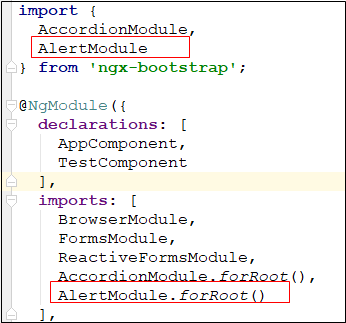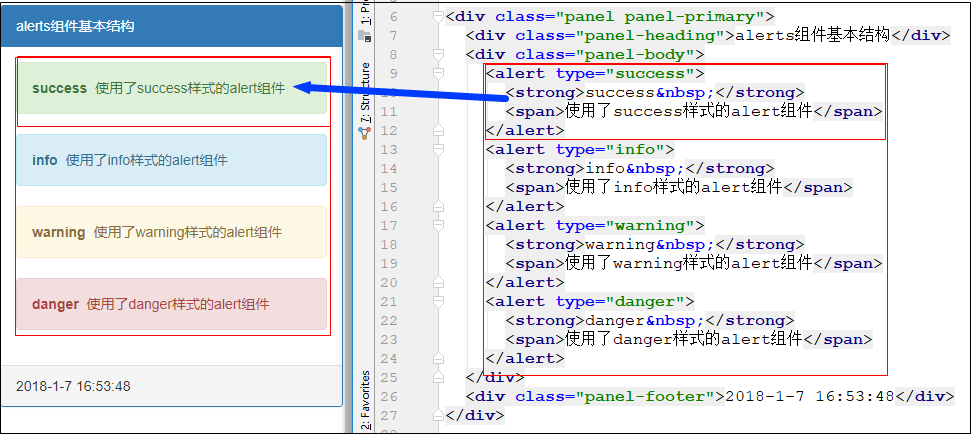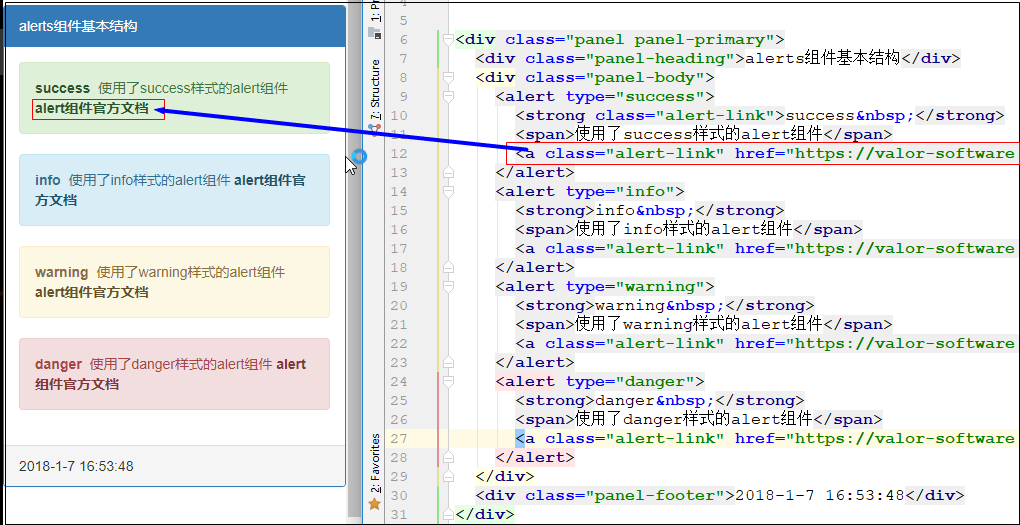ngx-bootstrap使用03 Alerts组件、利用Object.assign复制对象
1 Alerts
该组件用于给用户操作提供反馈信息或者提供一些警告信息
2 用法
2.1 下载ngx-bootstrap依赖
参考博文:点击前往
2.2 在模块级别导入AlertModule模块
技巧01:由于AlertModule是一个工具组件,在实际开发中一般都是在共享模块进行导入的


import { BrowserModule } from '@angular/platform-browser';
import { NgModule } from '@angular/core';
import { AppComponent } from './app.component';
import { TestComponent } from './test/test.component';
import {FormsModule, ReactiveFormsModule} from '@angular/forms';
import {
AccordionModule,
AlertModule
} from 'ngx-bootstrap';
@NgModule({
declarations: [
AppComponent,
TestComponent
],
imports: [
BrowserModule,
FormsModule,
ReactiveFormsModule,
AccordionModule.forRoot(),
AlertModule.forRoot()
],
providers: [],
bootstrap: [AppComponent]
})
export class AppModule { }
2.3 在需要用Alerts组件的地方直接使用alert选择器即可
<alert type="success"> hello boy </alert>
2.4 效果展示

3 实例讲解
3.1 基本使用结构
Alert组件可以包含任意长度的文本内容,还可以包含一个按钮来控制alert组件的隐藏;alert组件通过制定type属性的值来设置样式,type属性的值只能是success、info、warning、danger中的一个
3.1.1 alert组件样式
可以利用alert-*来给alert组件内的其他元素制定样式,aler-*样式列表如下

3.1.2 alert组件基本结构
<alert type="类型名称"> 内容 </alert>


<div class="panel panel-primary"> <div class="panel-heading">alerts组件基本结构</div> <div class="panel-body"> <alert type="success"> <strong>success </strong> <span>使用了success样式的alert组件</span> </alert> <alert type="info"> <strong>info </strong> <span>使用了info样式的alert组件</span> </alert> <alert type="warning"> <strong>warning </strong> <span>使用了warning样式的alert组件</span> </alert> <alert type="danger"> <strong>danger </strong> <span>使用了danger样式的alert组件</span> </alert> </div> <div class="panel-footer">2018-1-7 16:53:48</div> </div>

import { Component, OnInit } from '@angular/core';
@Component({
selector: 'app-test',
templateUrl: './test.component.html',
styleUrls: ['./test.component.scss']
})
export class TestComponent implements OnInit {
constructor() { }
ngOnInit() {
}
}
3.2 自动匹配颜色
为alert组件内部的其它元素添加alert-link类去自动根据alert组件的类型进行颜色匹配
技巧01:如果alert组件内部的元素不指定alert-link类,会自动进行颜色匹配
技巧02:如果alert组件内部的其他元素制定了alert-link类,不仅会进行颜色自动匹配还会进行加粗设置


<div class="panel panel-primary"> <div class="panel-heading">alerts组件基本结构</div> <div class="panel-body"> <alert type="success"> <strong class="alert-link">success </strong> <span>使用了success样式的alert组件</span> <a class="alert-link" href="https://valor-software.com/ngx-bootstrap/#/alerts">alert组件官方文档</a> </alert> <alert type="info"> <strong>info </strong> <span>使用了info样式的alert组件</span> <a class="alert-link" href="https://valor-software.com/ngx-bootstrap/#/alerts">alert组件官方文档</a> </alert> <alert type="warning"> <strong>warning </strong> <span>使用了warning样式的alert组件</span> <a class="alert-link" href="https://valor-software.com/ngx-bootstrap/#/alerts">alert组件官方文档</a> </alert> <alert type="danger"> <strong>danger </strong> <span>使用了danger样式的alert组件</span> <a class="alert-link" href="https://valor-software.com/ngx-bootstrap/#/alerts">alert组件官方文档</a> </alert> </div> <div class="panel-footer">2018-1-7 16:53:48</div> </div>

import { Component, OnInit } from '@angular/core';
@Component({
selector: 'app-test',
templateUrl: './test.component.html',
styleUrls: ['./test.component.scss']
})
export class TestComponent implements OnInit {
constructor() { }
ngOnInit() {
}
}
3.3 包含其它元素
alert元素可以包含其它的HTML元素


<div class="panel panel-primary"> <div class="panel-heading">alert包含其他HTML元素</div> <div class="panel-body"> <alert type="success"> <h2>包含其它元素</h2> <div>我是div元素</div> </alert> </div> <div class="panel-footer">2018-1-7 20:48:28</div> </div>

import { Component, OnInit } from '@angular/core';
@Component({
selector: 'app-test',
templateUrl: './test.component.html',
styleUrls: ['./test.component.scss']
})
export class TestComponent implements OnInit {
constructor() { }
ngOnInit() {
}
}
3.4 输入属性dismissible
当alert组件的dismissible属性值为真时就会出现一个关闭按钮,点击就可以关闭alert组件
技巧01:在typescript中利用Object.assign实现对象的复制
参考博文:点击前往


<div class="panel panel-primary"> <div class="panel-heading">输入属性diamissible</div> <div class="panel-body"> <alert type="success" dismissible="true"> <span class="alert-link">Dismissible</span> <span>当alert组件的dismissible属性值为真时就会出现一个关闭按钮,点击就可以关闭ale rt组件</span> </alert> <button class="btn-primary" (click)="onDismissible()">dismissible功能切换</button> <span *ngIf="dismissible">dismissible功能开启<button class="btn-info" (click)="onReset()">Reset</button></span> <span *ngIf="!dismissible">dismissible功能关闭</span> <alert *ngFor="let alert of alerts;" [dismissible]="dismissible"> <span class="alert-link">{{alert.title}}</span> <span>{{alert.content}}</span> </alert> </div> <div class="panel-footer">2018-1-7 20:55:33</div> </div>

import { Component, OnInit } from '@angular/core';
@Component({
selector: 'app-test',
templateUrl: './test.component.html',
styleUrls: ['./test.component.scss']
})
export class TestComponent implements OnInit {
alerts: Alert[];
dismissible = false;
constructor() { }
ngOnInit() {
this. alerts = [
new Alert('标题01', '内容01'),
new Alert('标题02', '内容02'),
new Alert('标题03', '内容03')
];
}
onDismissible() {
this.dismissible = !this.dismissible;
}
onReset() {
this.alerts = this.alerts.map((alert: Alert) => Object.assign(new Alert('', ''), alert));
}
}
export class Alert {
private _title;
private _content;
constructor(title, content) {
this._title = title;
this._content = content;
}
get title() {
return this._title;
}
set title(value) {
this._title = value;
}
get content() {
return this._content;
}
set content(value) {
this._content = value;
}
}
3.5 在alert组件内动态显示HTML代码
alert组件内部可以放其它的元素,如果我们想在alert组件内部动态地添加HTML代码,只需要利用ts将HTML代码进行封装即可
技巧01:在TS中的HTML代码需要利用DomSanitizer服务进行处理
技巧02:innerHtml和innerText的区别
innerHTML可以识别HTML标签和汉字
innerText会将所有的当成文本处理,而且不能识别汉字
技巧03:DomSanitizer服务可以实现跨站脚本攻击
参考博文:点击前往


<div class="panel panel-primary"> <div class="panel-heading">在alert组件内部显示HTML代码</div> <div class="panel-body"> <div *ngFor="let alert of alerts;"> <alert type="success" [type]="alert.type"> <span [innerHtml]="alert.content"></span> </alert> </div> </div> <div class="panel-footer">2018-1-7 22:05:05</div> </div>

import { Component, OnInit, SecurityContext } from '@angular/core';
import { DomSanitizer} from '@angular/platform-browser';
@Component({
selector: 'app-test',
templateUrl: './test.component.html',
styleUrls: ['./test.component.scss']
})
export class TestComponent implements OnInit {
alerts: Alert[];
dismissible = false;
constructor(
private domSanitizer: DomSanitizer
) { }
ngOnInit() {
this.alerts = [
new Alert('success', `<strong>内容01</strong>`),
new Alert('info', `<i>内容02</i>`),
new Alert('warning', '内容03')
];
this.alerts = this.alerts.map((alert: Alert) => new Alert(alert.type, this.domSanitizer.sanitize(SecurityContext.HTML, alert.content)))
}
}
export class Alert {
private _type;
private _content;
constructor(type, content) {
this._type = type;
this._content = content;
}
get type() {
return this._type;
}
set type(value) {
this._type = value;
}
get content() {
return this._content;
}
set content(value) {
this._content = value;
}
}
3.6 动态改变alert组件的内容
通过一个单机按钮来动态改变alert组件的内容,用一个列表来存储alert组件的内容
技巧01:*ngIf指令的使用
官方文档:点击前往


<div class="panel panel-primary"> <div class="panel-heading">动态显示alert组件的内容</div> <div class="panel-body"> <button *ngIf="index < messages.length - 1; else elseblock" class="btn-info" (click)="onAdd()">改变alert组件的内容</button> <ng-template #elseblock> <button class="btn-warning" (click)="index = 0">Reset</button> </ng-template> <alert>{{messages[index]}}</alert> </div> <div class="panel-footer">2018-1-7 22:38:03</div> </div>

import { Component, OnInit, SecurityContext } from '@angular/core';
import { DomSanitizer} from '@angular/platform-browser';
@Component({
selector: 'app-test',
templateUrl: './test.component.html',
styleUrls: ['./test.component.scss']
})
export class TestComponent implements OnInit {
messages: string[];
index = 0;
constructor(
) { }
ngOnInit() {
this.messages = [
'重庆市大足区',
'重庆市沙坪坝区',
'重庆市合川区'
];
}
onAdd() {
if (this.index !== this.messages.length - 1) {
this.index++;
}
}
}
3.7 定时消失
当alert组件的dismissOnTimeout属性的值设置了数值后,该alert组件就会在相应的时间后消失,例如
<alert type="success" [dismissOnTimeout]="5000"> <span class="alert-link">Success</span> <div>Welcom to the city of Chongqing. <- 5秒钟后我会消失哟</div> </alert>
代码解释:该alert组件会在5秒钟后消失
技巧01:alert组件的dismissOnTimeout属性值的单位是毫秒


<div class="panel panel-primary"> <div class="panel-heading">alert组件定时消失</div> <div class="panel-body"> <alert type="success" [dismissOnTimeout]="5000"> <span class="alert-link">Success</span> <div>Welcom to the city of Chongqing. <- 5秒钟后我会消失哟</div> </alert> <alert type="info" *ngFor="let alert of alerts;" [type]="alert?.type" [dismissOnTimeout]="alert?.timeOut"> {{alert?.message}} </alert> <button class="btn-primary" (click)="onAdd()">添加alert组件</button> </div> <div class="panel-footer">2018-1-8 09:48:18</div> </div>

import { Component, OnInit, SecurityContext } from '@angular/core';
import { DomSanitizer} from '@angular/platform-browser';
@Component({
selector: 'app-test',
templateUrl: './test.component.html',
styleUrls: ['./test.component.scss']
})
export class TestComponent implements OnInit {
alerts: Alert[];
alert = new Alert('info', '3秒钟后会消失', 3000);
constructor(
) { }
ngOnInit() {
this.alerts = [];
}
onAdd() {
this.alerts.push(this.alert);
}
}
export class Alert {
private _type: string;
private _message: string;
private _timeOut: number;
constructor(type: string, message: string, timeOut: number) {
this._type = type;
this._message = message;
this._timeOut = timeOut;
}
get type(): string {
return this._type;
}
set type(value: string) {
this._type = value;
}
get message(): string {
return this._message;
}
set message(value: string) {
this._message = value;
}
get timeOut(): number {
return this._timeOut;
}
set timeOut(value: number) {
this._timeOut = value;
}
}
4 Alert API
4.1 alert组件选择器
<alert></alert>
4.2 输入属性
4.2.1 dismissible
类型:Boolean
默认值:false
说明:如果设置了dismissible属性值为true,alert组件就会出现一个关闭按钮,点击他就可以关闭该alert组件


<div class="panel panel-primary"> <div class="panel-heading">alert组件的输入属性dismissible</div> <div class="panel-body"> <alert type="success" dismissible="true">hello boy</alert> </div> <div class="panel-footer">2018-1-8 11:23:02</div> </div>
4.2.2 dismissOnTimeout
类型:string/number
说明:单位是毫秒,在设定的毫秒后alert组件会自动关闭

<div class="panel panel-primary"> <div class="panel-heading">alert组件的dismissOnTimeout</div> <div class="panel-body"> <alert type="success" dismissOnTimeout="3000"> 3秒钟后我会消失 </alert> </div> <div class="panel-footer">2018-1-8 13:31:05</div> </div>
4.2.3 isOpen
类型:boolean
默认值:true
说明:isOpen属性值为true时alert组件会显示,为false就会消失


<div class="panel panel-primary"> <div class="panel-heading">alert组件的isOpen属性</div> <div class="panel-body"> <button class="btn-danger" *ngIf="open; else elseblock" (click)="onClose()">关闭</button> <ng-template #elseblock> <button class="btn-primary" (click)="onOpen()">打开</button> </ng-template> <alert type="success" [isOpen]="open"> 我出现啦 </alert> </div> <div class="panel-footer">2018-1-8 13:31:05</div> </div>

import { Component, OnInit, SecurityContext } from '@angular/core';
import { DomSanitizer} from '@angular/platform-browser';
@Component({
selector: 'app-test',
templateUrl: './test.component.html',
styleUrls: ['./test.component.scss']
})
export class TestComponent implements OnInit {
open = true;
constructor(
) { }
ngOnInit() {
}
onClose() {
this.open = false;
}
onOpen() {
this.open = true;
}
}
export class Alert {
private _type: string;
private _message: string;
private _timeOut: number;
constructor(type: string, message: string, timeOut: number) {
this._type = type;
this._message = message;
this._timeOut = timeOut;
}
get type(): string {
return this._type;
}
set type(value: string) {
this._type = value;
}
get message(): string {
return this._message;
}
set message(value: string) {
this._message = value;
}
get timeOut(): number {
return this._timeOut;
}
set timeOut(value: number) {
this._timeOut = value;
}
}
4.2.4 type
类型:string
默认值:warning
说明:该属性是用来指定的alert组件的样式的,只能是primary,info,warning,danger
4.3 输出属性
4.3.1 onClose
说明:调用相关方法关闭alert组件时触发该事件,此时alert组件的isOpen属性值为true


<div class="panel panel-primary"> <div class="panel-heading">alert组件的isOpen属性</div> <div class="panel-body"> <button class="btn-danger" *ngIf="open; else elseblock" (click)="onClose()">关闭</button> <ng-template #elseblock> <button class="btn-primary" (click)="onOpen()">打开</button> </ng-template> <alert dismissible="true" type="success" [isOpen]="open" (onClosed)="closed($event)" (onClose)="close($event)"> 我出现啦 </alert> </div> <div class="panel-footer">2018-1-8 13:31:05</div> </div>

import { Component, OnInit, SecurityContext } from '@angular/core';
import { DomSanitizer} from '@angular/platform-browser';
@Component({
selector: 'app-test',
templateUrl: './test.component.html',
styleUrls: ['./test.component.scss']
})
export class TestComponent implements OnInit {
open = true;
constructor(
) { }
ngOnInit() {
}
onClose() {
this.open = false;
}
onOpen() {
this.open = true;
}
close(event: any) {
alert('将要执行关闭操作');
// console.log(JSON.stringify(event));
console.log(event);
}
closed(event: any) {
alert('关闭操作执行完毕');
// console.log(JSON.stringify(event));
console.log(event);
}
}
export class Alert {
private _type: string;
private _message: string;
private _timeOut: number;
constructor(type: string, message: string, timeOut: number) {
this._type = type;
this._message = message;
this._timeOut = timeOut;
}
get type(): string {
return this._type;
}
set type(value: string) {
this._type = value;
}
get message(): string {
return this._message;
}
set message(value: string) {
this._message = value;
}
get timeOut(): number {
return this._timeOut;
}
set timeOut(value: number) {
this._timeOut = value;
}
}
4.3.2 onClosed
说明:alert组件关闭完成后触发该事件,此时alert组件的isOpen属性为false
<div class="panel panel-primary"> <div class="panel-heading">alert组件的isOpen属性</div> <div class="panel-body"> <button class="btn-danger" *ngIf="open; else elseblock" (click)="onClose()">关闭</button> <ng-template #elseblock> <button class="btn-primary" (click)="onOpen()">打开</button> </ng-template> <alert dismissible="true" type="success" [isOpen]="open" (onClosed)="closed($event)" (onClose)="close($event)"> 我出现啦 </alert> </div> <div class="panel-footer">2018-1-8 13:31:05</div> </div>

import { Component, OnInit, SecurityContext } from '@angular/core';
import { DomSanitizer} from '@angular/platform-browser';
@Component({
selector: 'app-test',
templateUrl: './test.component.html',
styleUrls: ['./test.component.scss']
})
export class TestComponent implements OnInit {
open = true;
constructor(
) { }
ngOnInit() {
}
onClose() {
this.open = false;
}
onOpen() {
this.open = true;
}
close(event: any) {
alert('将要执行关闭操作');
// console.log(JSON.stringify(event));
console.log(event);
}
closed(event: any) {
alert('关闭操作执行完毕');
// console.log(JSON.stringify(event));
console.log(event);
}
}
export class Alert {
private _type: string;
private _message: string;
private _timeOut: number;
constructor(type: string, message: string, timeOut: number) {
this._type = type;
this._message = message;
this._timeOut = timeOut;
}
get type(): string {
return this._type;
}
set type(value: string) {
this._type = value;
}
get message(): string {
return this._message;
}
set message(value: string) {
this._message = value;
}
get timeOut(): number {
return this._timeOut;
}
set timeOut(value: number) {
this._timeOut = value;
}
}
4.4 官方文档
点击前往


